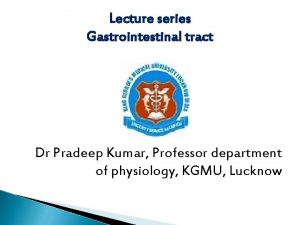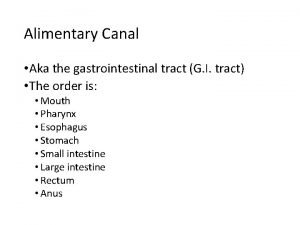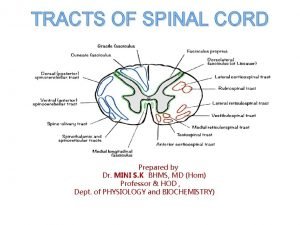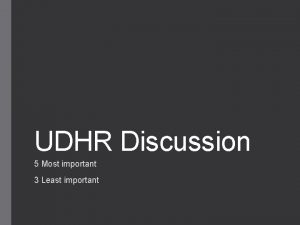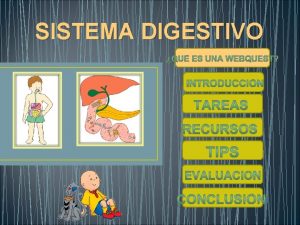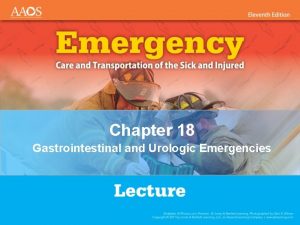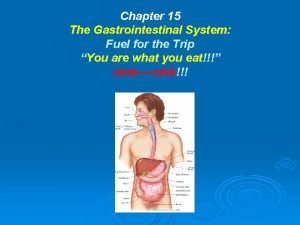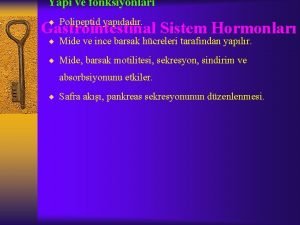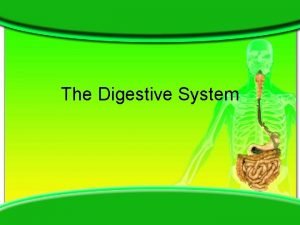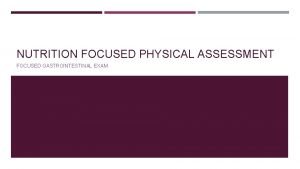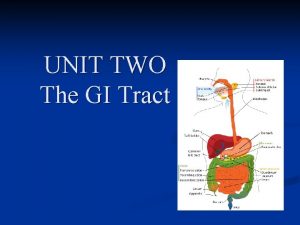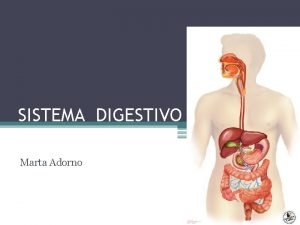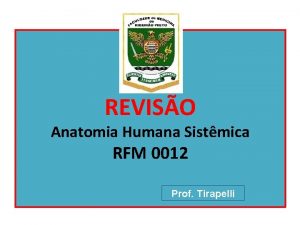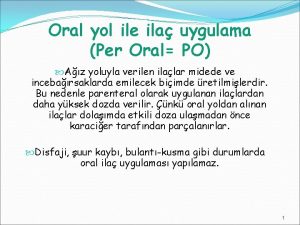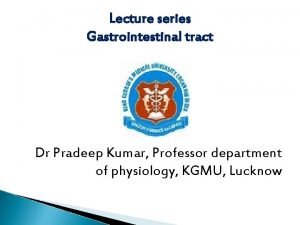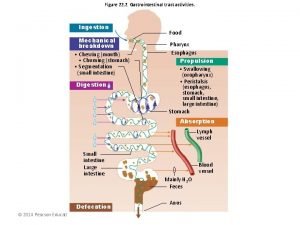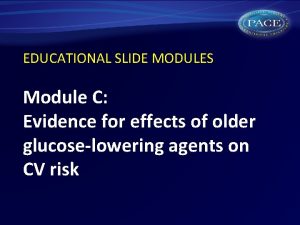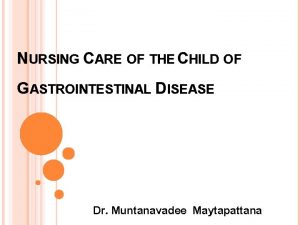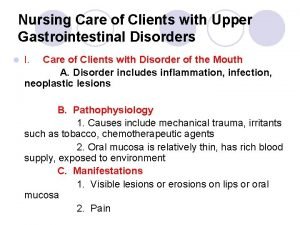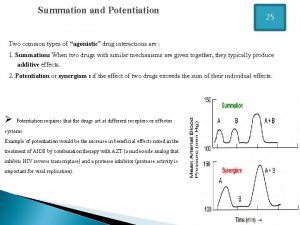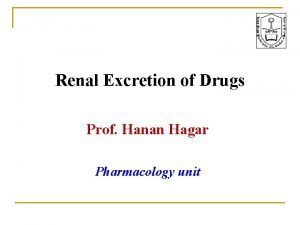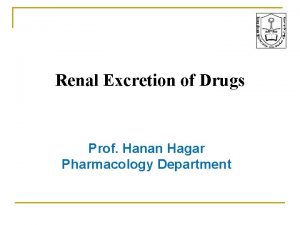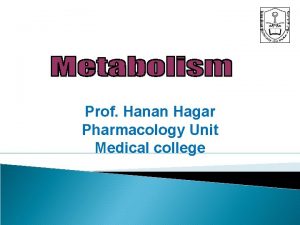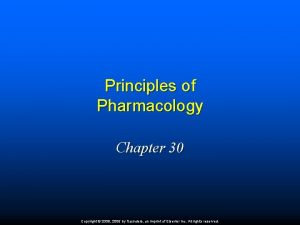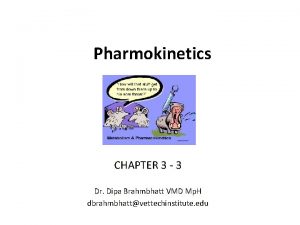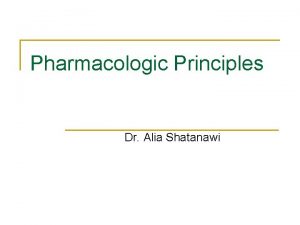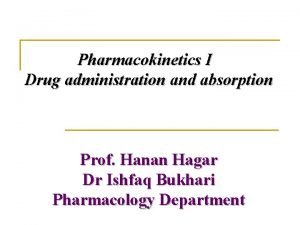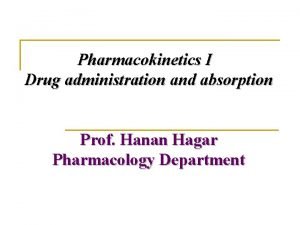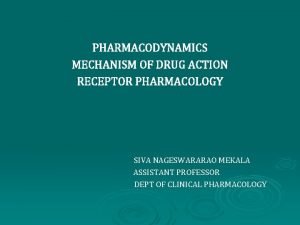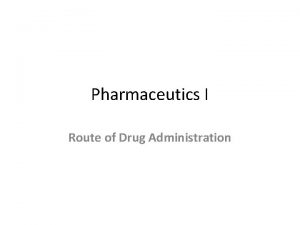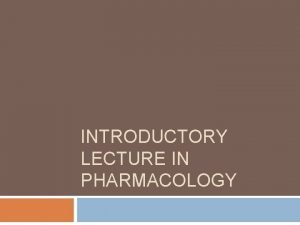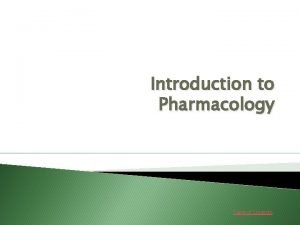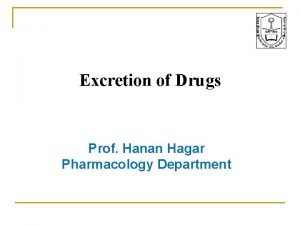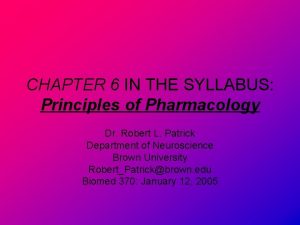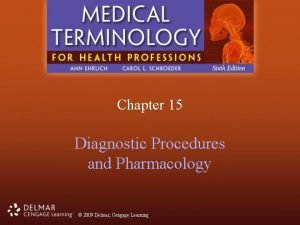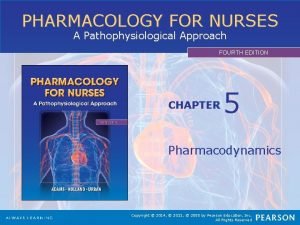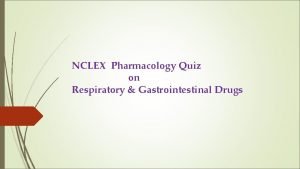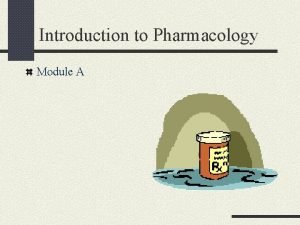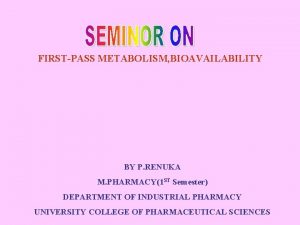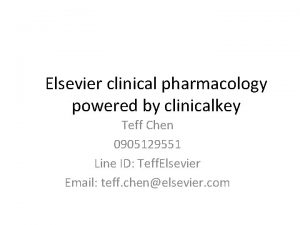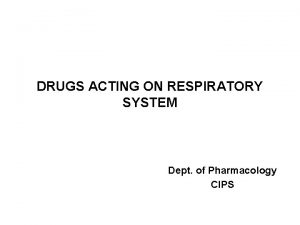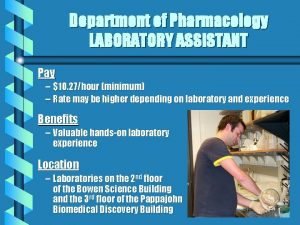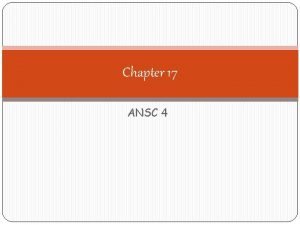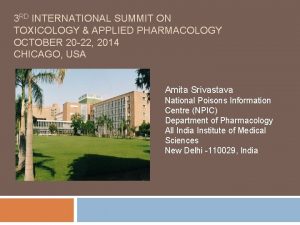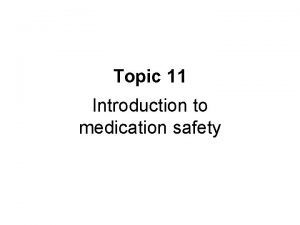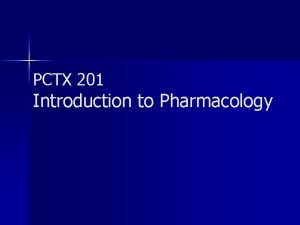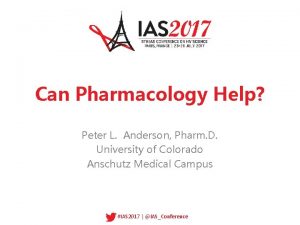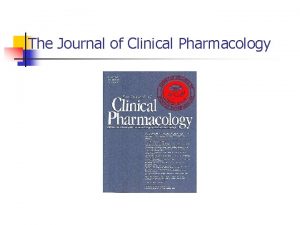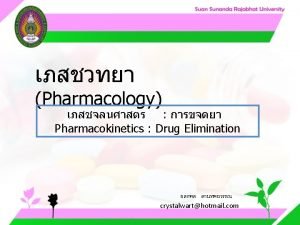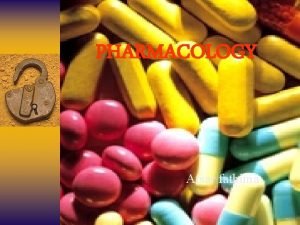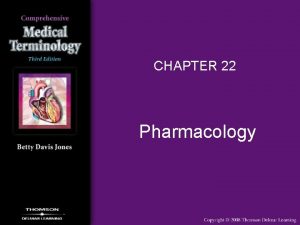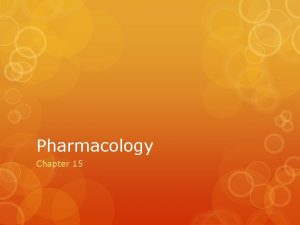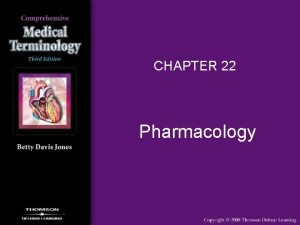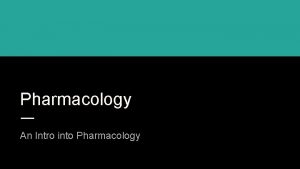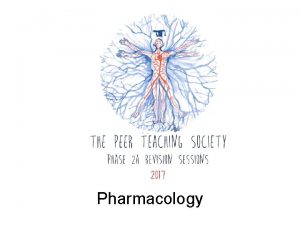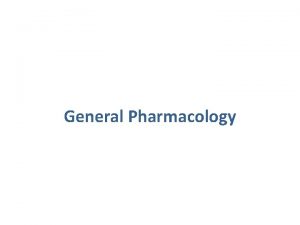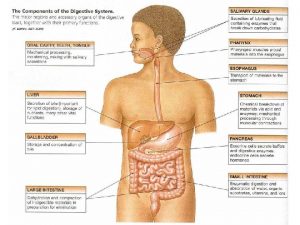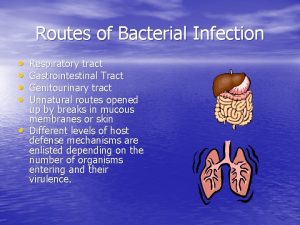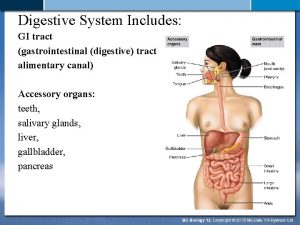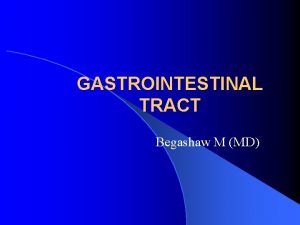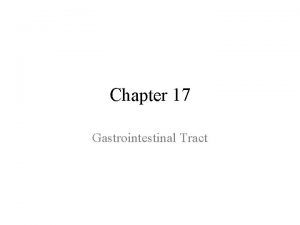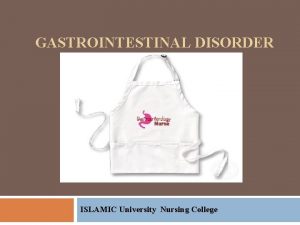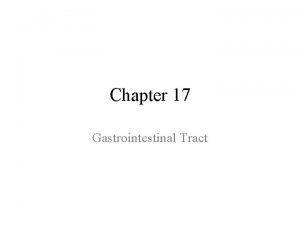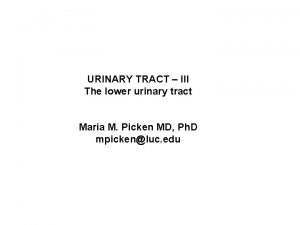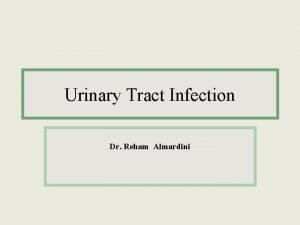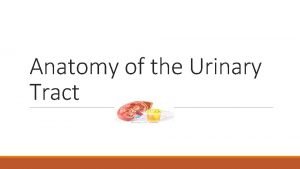Gastrointestinal Pharmacology The gastrointestinal tract has many important





























































- Slides: 61

Gastrointestinal Pharmacology

The gastrointestinal tract has many important functions: • • Digestive Excretory Endocrine Exocrine

Gastrointestinal Pharmacology • Because of the complexity of GI functions and disorders, many classes of drugs are used in the treatment of the various GI disorders

We will divide the disorders into groups: • • • Acid/Peptic Diseases Vomiting Motility Disorders Inflammatory Bowel Disease Irritable Bowel Syndrome

Acid/Peptic Disease • The stomach produces hydrochloric acid, with a p. H of about 3 • The main purpose of this acidic secretion is to sterilize food as it enters the body

In certain situations, this acid can do damage to: • Esophagus • Stomach • Duodenum

Acid/Peptic Disease • The stomach produces mucous that lines the stomach and protects the stomach from the acid • Sometimes the stomach does not produce enough of this protective mucous

Acid/Peptic Disease • Sometimes the stomach does not produce enough of this protective mucous, this can be caused by: STRESS!

• If more stomach acid is produced than what the protective mucous lining can handle, the result can be: • - gastritis • - errosions – preulcers • - ulcers (peptic ulcer disease, PUD)

Picture of Gastrointestinal Tract

Stomach errosion

Stomach errosion

Acid/Peptic Disease • Sometimes the stomach acid is refluxed into the esophagus – Gastro Esophageal Reflux Disease (GERD)


Acid/Peptic Disease • If GERD is severe enough, it can change the lining of the esophagus: • - esophagitis • - errosions • - strictures • - Barrett’s Esophagitis – precancerous

Esophageal Stricture

Acid/Peptic Disease • Sometimes GERD is caused by hiatal hernia, a herniation of the stomach through the opening in the diaphragm for the esophagus • A hernia happens when part of an internal organ or tissue bulges through a weak area of muscle or any part of a bulb that sticks through a hole where it doesn’t belong


Acid/Peptic Disease • Sometimes excess stomach acid production can lead to ulcers of the duodenum as well


Acid/Peptic Disease • A rare disorder, Zollinger-Ellison is due to tumors of the pancreas that secrete gastrin, signalling the stomach to produce too much acid, which results in severe gastric and duodenal ulcers

Acid/Peptic Disease • Sometimes peptic ulcer disease is caused by bacteria – Helicobacter Pylori – (H. Pylori)

Pharmacologic Treatment of Acid/Peptic Disease • • • Strategies for treating acid/peptic disease are: - neutralize acid - decrease acid production - protect stomach lining - antibiotics for H. Pylori

Pharmacologic Treatment of Acid/Peptic Disease • Antacids are weak bases that help to neutralize acid



Pharmacologic Treatment of Acid/Peptic Disease • • • Antacids are weak bases: - magnesium hydroxide - aluminum hydroxide - calcium carbonate - sodium bicarbonate

Magnesium Hydroxide • Not absorbed by the GI tract • Laxative Effect

Aluminum Hydroxide • Not absorbed by the GI tract • Constipating Effect

Calcium Carbonate and Sodium Bicarbonate • Are absorbed systemically and can affect the bodies acid base balance

Drugs used to decrease acid production • Proton Pump Inhibitors (PPI) • H 2 Blockers • - Histamine receptor type 2 antagonists

Proton Pump Inhibitors (PPI) • • • Omeprazole (Prilosec) Ansoprazole (Prevacid) Esomeprazole (Nexium) Pantoprazole (Protonix) Rabeprazole (Aciphex)

Pharmacologic Treatment of Acid/Peptic Disease • • • H 2 Blockers - cimetidine (Tagamet) - famotidine (Pepcid) - nizatidine (Axid) - ranitidine (Zantac)

Protect stomach lining Drugs used to protect stomach lining: - sucrusulfate (Carafate) - colloidal bismuths (Pepto Bismol) - misoprostol/ Cytotec – contraindicated in pregnancy • *prostaglandin analog • •

Antibiotics used to treat H. Pylori • • Tetracycline Metronidazole (Flagyl) Amoxicillin Clarithromycin (Biaxin)

Pharmacologic Treatment of Acid/Peptic Disease • Colloidal bismuths have antimicrobial properties as well

Gastrointestinal Pharmacology • • • We will divide the disorders into groups: - Acid/Peptic Diseases - Vomiting - Motility Disorders - Inflammatory Bowel Disease - Irritable Bowel Syndrome

Gastrointestinal Pharmacology • Drugs that prevent vomiting are called antiemetics. Many classes of drugs are used as antiemetics.

Antiemetics • • • 5 -HT 3 antagonists – serotonin antagonists D 2 antagonists – antipsychotics H 1 antagonists – antihistamines Antimuscurinics Cannabinoids – active ingredient in marijuana

Antiemetics • • 5 -HT 3 antagonists - ondansetron (Zofran) D 2 antagonists - metoclopramide (Reglan) - prochlorperazine (Compazine) - promethazine (Phenergan) - droperidol (Inapsine)

Antiemetics • • • H 1 antagonists - diphenhydramine (Benadryl) - meclizine (Bonine) Antimuscurinics - scopolamine - dimenhydrinate

• Many H 1 antagonists have anticholinergic, antimuscurinic properties, you will often see these cross listed

Antiemetics • Cannabinoids are the active ingredient in marijuana: • - Dronabinal • - Nabilone

Motility Disorders • Common motility disorders are: • - Gastroparesis – stomach weakness/stomach paralysis • - Neuropathy • - Diabetes mellitus • - Parkinsons, other neurologic disorders • Ileus • - postsurgical

Drugs used to treat motility disorders are also called prokinetics: • Cholinomimetics • - bethanecol – muscurinic agonist • - neostigmine – acetylcholinesterase inhibitor

Gastrointestinal Pharmacology • Drugs used to treat motility disorders are also called prokinetics. • - metoclopramide (Reglan)

Inflammatory Bowel Disease (IBD) • Inflammatory bowel disease disorders that cause the intestines to become inflamed (red and swollen). The inflammation lasts a long time and usually recurs

IBD • Symptoms include abdominal cramps and pain, diarrhea, weight loss and bleeding from the intestines

IBD • There are two main forms of inflammatory bowel disease: • - Crohn’s disease • - ulcerative colitis

Pharmacology Treatment of IBD • Drugs used to treat inflammatory bowel disease are: • - immunosuppresive antimetabolites • - azathiorine • - 6 mercaptopurine • - methotrexate

Drugs used to treat IBD are: • Antitumor necrosis factor alpha • - infliximab (Remicade)

Drugs used to treat IBD are: • Aminosalicylates (prostaglandin inhibitor) • - mesalamine (Pentasa, Rowasa, Asacol) • - sulfasalazine (Azulfidine)

Do not confuse • • IBD – Inflammatory Bowel Disease - Crohn’s - Ulcerative Colitis IBS – Irritable Bowel Syndrome

IBS • Some people have constipation which means hard, difficult-to-pass, infrequent bowel movements. Often these people report straining and cramping when trying to have a bowel movement but cannot eliminate any stool

IBS • Some people with IBS experience diarrhea, which is frequent, loose, watery, stool. People with diarrhea frequently feel an urgent and uncontrollable need to have a bowel movement.

IBS • Most people with IBS alternate between constipation and diarrhea.

IBS • Sometimes people find that their symptoms subside for a few months and then return, while others report a consistent worsening of symptoms over time.

IBS • STRESS is a contributing factor in IBS • IBS does not result in blood in stool

Pharmacologic Treatment of IBS • • Drugs used to treat IBS include: - 5 -HT 3 receptor antagonists - alosetron (Lotronix) - IBS with predominant diarrhea

Drugs used to treat IBS include • 5 -HT 4 receptor antagonists • - tegaserod (Zelnorm) • - IBS with predominant constipation

Drugs used to treat IBS include: • Anticholinergics • - hyoscyamine (Levsin)
 Gastrointestinal tract
Gastrointestinal tract Gastrointestinal tract
Gastrointestinal tract Gastrointestinal tract
Gastrointestinal tract Distal organ
Distal organ Extrapyramidal tract function
Extrapyramidal tract function Rubrospinal tract
Rubrospinal tract Newspaper article format
Newspaper article format Inverted pyramid in news writing
Inverted pyramid in news writing Least important to most important
Least important to most important Embriologia del sistema gastrointestinal
Embriologia del sistema gastrointestinal Emt chapter 18 gastrointestinal and urologic emergencies
Emt chapter 18 gastrointestinal and urologic emergencies Chapter 15 the gastrointestinal system
Chapter 15 the gastrointestinal system Gastrointestinal hormones
Gastrointestinal hormones Dr sigid djuniawan
Dr sigid djuniawan Equimosis colores
Equimosis colores Gastrointestinal sistem hormonları
Gastrointestinal sistem hormonları Gastrointestinal medical terminology breakdown
Gastrointestinal medical terminology breakdown Nutrition focused physical findings
Nutrition focused physical findings Foregut
Foregut Motilidad gastrointestinal
Motilidad gastrointestinal Gastinoma
Gastinoma Arteria e veia
Arteria e veia Sistema digestorio
Sistema digestorio Functional constipation vs hirschsprung
Functional constipation vs hirschsprung P.o ilaç uygulaması
P.o ilaç uygulaması Intestinal villus
Intestinal villus Peristalsis and segmentation
Peristalsis and segmentation Why does metformin cause diarrhea
Why does metformin cause diarrhea Hirschsprung disease nursing management
Hirschsprung disease nursing management Pathophysiology of intestinal obstruction
Pathophysiology of intestinal obstruction Pharmacology and venipuncture in radiology pdf
Pharmacology and venipuncture in radiology pdf Potentiation pharmacology example
Potentiation pharmacology example Factors affecting excretion of drugs ppt
Factors affecting excretion of drugs ppt What is ion trapping in pharmacology
What is ion trapping in pharmacology Drug metabolism definition
Drug metabolism definition Chapter 30 principles of pharmacology
Chapter 30 principles of pharmacology What is ion trapping in pharmacology
What is ion trapping in pharmacology What is pharmacology
What is pharmacology Drug excretion
Drug excretion What are the different routes of drug administration
What are the different routes of drug administration Mechanism of drug action
Mechanism of drug action First pass effect
First pass effect Alpha 1 vs alpha 2 receptors
Alpha 1 vs alpha 2 receptors What is pharmacology
What is pharmacology Slidetodoc
Slidetodoc Pharmacology introduction
Pharmacology introduction What is ion trapping in pharmacology
What is ion trapping in pharmacology Basic principles of pharmacology
Basic principles of pharmacology Chapter 15 diagnostic procedures and pharmacology
Chapter 15 diagnostic procedures and pharmacology Pharmacology for nurses: a pathophysiological approach
Pharmacology for nurses: a pathophysiological approach Respiratory pharmacology quiz
Respiratory pharmacology quiz Pharmacology module
Pharmacology module Hepatic extraction ratio
Hepatic extraction ratio Clinical pharmacology powered by clinicalkey
Clinical pharmacology powered by clinicalkey Pharmacology of drugs acting on respiratory system
Pharmacology of drugs acting on respiratory system Pharmacology pay
Pharmacology pay Ansc 497
Ansc 497 Toxicology and applied pharmacology
Toxicology and applied pharmacology Rationale meaning in pharmacology
Rationale meaning in pharmacology Pharmacology chapter 1
Pharmacology chapter 1 Pharmacology tutor anderson
Pharmacology tutor anderson Clinical pharmacology
Clinical pharmacology

